Genre: Platformer Developer: Virgin Games Publisher: Virgin Games Players: 1 Released: 1993
At some point in the early ’90s, video game developers decided kids cared about the environment. Captain Planet, Awesome Possum, Toejam & Earl: Panic on Funkatron, and other Genesis games carried with them environmental friendly messages to varying degrees of finger wagging. Mick & Mack as the Global Gladiators is one such game, which is odd given its fast food ties — Mick and Mack are plays on the McDonald’s name, and Global Gladiators is a McDonald’s game. Companies using video games to promote their brands is hardly new – after all, Chase the Chuck Wagon was showing kids that Chuck Wagon dog food has the gravy taste dogs couldn’t wait to finish way back on the Atari 2600. Though a fast food vendor is an odd source of “inspiration” for a game, let alone an environmentally themed one, it’s ultimately no different than the myriad of movie and toy tie-ins video games have seen over the years.
Unfortunately, some may view the McDonald’s tie-in as a strike against the game and blind them from the odd truth — Global Gladiators is a good game. In fact, in Andy Eddy’s Video Games & Computer Entertainment review, he gave the game a perfect score, stating that it could give Sonic the Hedgehog 2 a run for its money come 1992 Christmas season. Where the NES Global Gladiators reeks of the typical quick cash-in attempt, the Genesis game is a surprisingly well designed, good looking, and enjoyable run-and-gun platformer. For this we can thank David Perry, that legendary Genesis programmer who would go on to create another brand-turned-video game with Cool Spot along with creating Earthworm Jim and a slew of other Genesis hits. Perry’s 16-bit games were famous for pushing the systems to the limits, featuring great level design and incredible animation.
Global Gladiators itself boasts having 1,250 frames of animation, then unheard of for a game, especially one weighing in at a paltry four megabits. Everything is so fluid, with water sparkling, sludge burping, and invisible discs shimmering when stepped upon. As with every post-Sonic the Hedgehog game, Mick and Mack have a number of gratuitous idle animations including twirling their GooShooter™ or playing with their gum. Hold right on the D-pad and they will pick up speed and go into a full run; stop and they will skid Sonic-style, digging their heels into the grounds to brake. The enemies move just as smoothly, and though the game lacks special effects such as transparencies or reflections, the game looks good and has aged well.
Complimenting the excellent graphics is a very good soundtrack by Tommy Tallarico. There are only a handful of songs, but a couple of them (“McRock” and “Dance Tune”) are incredible. “McRock” is a lengthy synth rock track powered by a driving drum beat, electric rhythm guitar, and dual keyboard leads. “Dance Tune” highlights the crystal clear vocal samples used in the game, splicing them into a very catchy techno song for the game’s bonus round. Unfortunately, the other four songs aren’t nearly as good or inspired.
Yes, that’s no mistake – the game is pretty sparse on the soundtrack. Each of the four levels has its own theme along with the bonus round, boss, and ending themes. The brief introduction cinema is just various samples of the game’s sound and vocal effects. The game may skimp on the music, but the vocal and sound effects are plentiful and sound terrific. From the clear shouts of “You did it!” and “Awesome” to the Do-Re-Mi pickup tones for the Golden Arches scattered about the levels, Tallarico shows he is a master of the Genesis sound chip. It’s a real shame that there isn’t more, but given the quality of the samples and song length, I’m sure space must be an issue given the small cartridge memory,
It’s a definite sign of the game’s quality that it leaves the player wanting more. With four unique levels, each with three alternate stages, the game just feels short… and it is. With plenty of checkpoints, health, 1-Ups, and timer bonuses in each stage, there is very little here to challenge the player. Mick and Mack just jump from platform to platform firing their six-directional GooShooters™, guns which spray a small blob of goop which flies a short distance and falls. Most enemies do fire projectiles, but rapid spraying with the GooShooter™ is certain to pick them off before they can become a real threat. In fact, the GooShooter™ arguably poses the biggest danger to Mick and Mack since firing the gun pushes them backwards a bit, and a careless player can easily shoot his way into a bottomless pit just by shooting the thing.
Another issue is that there just isn’t enough variety among the stages, and the game really peaks with Slime World, the very first level. Mystical Forest, Toxi-Town, and Arctic World introduce new enemies, but the overall attack patterns and level design remains the same for the most part. Slime World features Jet Pipes to rocket the player into the sky, oozing Slime-O-Matic Mark II machines to destroy, and, as mentioned, the best music in the game. The levels which follow do nothing to build upon it and feel like a letdown by comparison. Instead of facing the slime spitting Goober in Slime World, it’s now the log throwing Biz “E” Beaver of Mystical Forest, can chucking Toxi-Town Trashcan, or snowball hurling Frosty the polar bear. Only the very last stage played even has a boss character, and it is a unspectacular pushover itself, matched only by the game’s equally unspectacular ending. It’s still a solid game, but doing the same thing over twelve rounds with little real variance may not entice players to complete the journey.
The real incentive to continue to play Global Gladiators is the bonus round. Collect at least 75 of the 100 multicolored Golden Arches in each level, and Mick and Mack will be transported to the bonus level where they can recycle for extra continues and lives. Papers, bottles, and cans drop down from the sky, and the player has to toss them into the right bin. If an item is allowed to rest on the ground after a few bounces, the round ends. As the difficulty increases, it becomes necessary to “juggle” the items by running over them to pick them up and tossing them just to keep them in play while sorting items closer to their respective bins.
The above paragraph hardly does the bonus round justice. It’s a really fun distraction, and thankfully it is accessible from the options menu. The options menu also offers a music and sound test, difficulty selection, and the ability to play as Mick or Mack. Global Gladiators is a one-player game, and while both characters are identical in appearance and abilities, it’s still a notable feature for Global Gladiators is one of a handful of 16-bit games with a non-white protagonist. Perhaps it’s a subtle social statement on the industry or just part of the game’s corporate marketing, trying to have it appeal to a broader audience? In either case, it’s an understated welcome addition and one which need not be harped upon to make its point or impede the pickup-and-play mentality the game exudes. From the dreary Virgin opening Sega parody chant to the in-between round one-liners (“Anvils don’t make very good hats, do they?”), Global Gladiators is light-hearted fun for everyone.
Where Global Gladiators really succeeds is allowing the game to be fun on its own without beating the corporate or environmentalist messages over the player’s head to the point that the game feels more like a commercial or lecture than entertainment. Aside from Ronald McDonald appearing to mark each round’s end and the opening and closing cinema along with the Golden Arches to collect, the game is largely free of McDonald’s marketing. In fact, other than the copyright, there is nothing on the box to indicate that Global Gladiators is a McDonald’s licensed game at all. Likewise, aside from the “Ready To Recycle” message and theme of the bonus level, there’s nothing here that really reeks of Captain Planet style over-the-top environmentalism.
It’s just a simple, fun game, and that’s all it really needs to be. While Global Gladiators lacks the depth or inventiveness to warrant extended play, it’s definitely an enjoyable, quick romp and a chance to experience what can be regarded as David Perry’s and Tommy Tallarico’s breakout game. I didn’t agree with the perfect score Andy Eddy gave the game then or now, but just the same, there are few real faults to argue against such a score for long.
SCORE: 7 out of 10

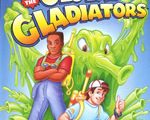
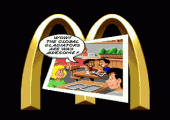
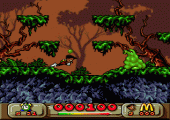
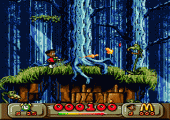
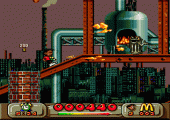
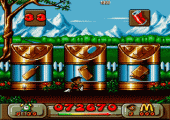
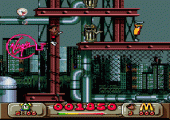
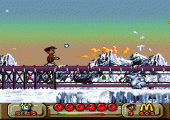
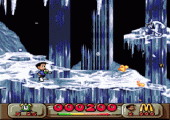
The graphics, music and slime effects are fun, but the game goes on for too long in my opinion. 6/10